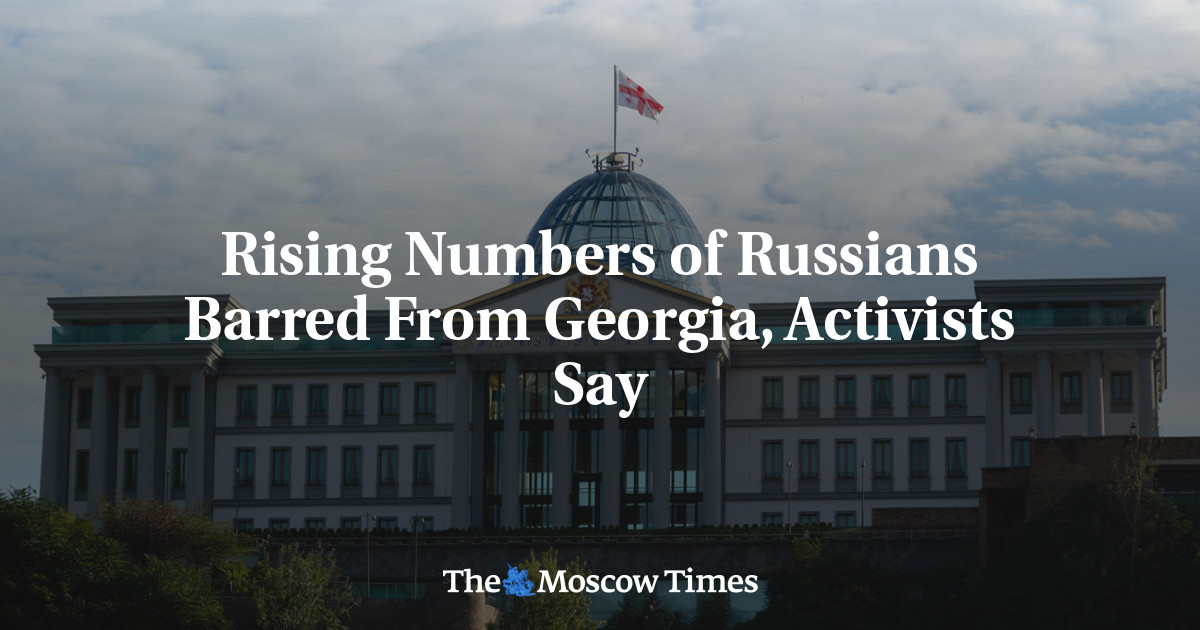
The South Caucasus nation of Georgia, a popular destination for Russians opposed to the invasion of Ukraine, is increasingly denying entry to Russian citizens, local activists told The Moscow Times.
More than a dozen Russians are blocked from Georgia every day, Yegor Kuroptev, director of the Free Russia Foundation in the South Caucasus, said Thursday.
“One of the main reasons is the general desire in Georgia and in the world to limit the flow of Russians,” Kuroptev told The Moscow Times.
Thousands of anti-war Russians, including many journalists, activists and opposition politicians, moved to Georgia following the start of the Kremlin’s invasion of Ukraine, fearing political repression or conscription at home.
Georgia has sporadically blocked Russians from entering the country for years, but, according to Kuroptev, the number of such cases now appears to be rising.
Russian journalist and media manager Mitya Aleshkovsky, who moved to the Georgian capital of Tbilisi earlier this year, was deported Wednesday with no official explanation, according to a Facebook post by his mother, historian Tamara Eidelman.
And Russian photojournalist Vasily Krestyaninov told The Moscow Times on Thursday that he had been refused entry to Georgia twice in less than two weeks.
Krestyaninov, who moved to Georgia last year, attempted to fly into the country on Aug. 23 and last week, but was deported both times with no explanation from border guards.
“Both times border guards didn’t tell me anything and didn’t give me any documents. So I can only guess why they deported me. I think it is political pressure due to my journalistic and political activity,” he told The Moscow Times.
According to Kuroptev, who first commented on the issue to Russian media outlet Agentstvo, the main problem for anti-war Russians entering Georgia is “the lack of transparency” about why such deportations occur.
“Unfortunately, we cannot say that a person will definitely enter the country having a certain set of documents,” he said in a phone interview. “Border control is quite random.”
As of June, about 300,000 Russians had successfully crossed the Georgian border following the start of the Kremlin’s war in Ukraine, according to Georgian media outlet JAMNews.
Krestyaninov said he was not allowed to see the official documents issued by the Georgian authorities when he was denied entry, but he managed to “take a look” after they were handed to a flight attendant.
According to Krestyaninov, the official explanation was simply “other reasons.”
Krestyaninov works with a number of media outlets, including Russian investigative project The Insider and The Associated Press, and often travels abroad as a journalist. He said he had not previously faced any significant difficulties entering Georgia.
Fyodor Telin, the former lawyer for an organization linked to jailed Kremlin critic Alexey Navalny, said in an interview Tuesday he was denied entry to Georgia twice in recent weeks.
Telin, who moved to Tbilisi last year, said that he had unsuccessfully attempted to seek political asylum in Georgia. “Both entry into the country and my asylum [request] were denied,” he said. He is apparently still planning to go back to Georgia.
The Russian consulate in the Turkish city of Trabzon said last month that Russian travelers trying to cross by land from Turkey into Georgia were increasingly being denied entry.
A member of Russian protest group Pussy Riot, Olga Borisova, was denied entry to Georgia in June after returning from a Pussy Riot tour to raise money for Ukrainian refugees. On a subsequent attempt to enter the country, however, she was allowed in.
Even before the war, a number of prominent Russian opposition figures were blocked from Georgia, including politicians Lyubov Sobol and Dmitry Gudkov.
Krestyaninov, who’s currently staying in neighboring Armenia, said he had filed an appeal with the Georgian authorities but he has “little hope” of success.
“I would not advise other activists to move to Georgia… you might be barred from entering the country where you have an apartment and all your stuff,” he said.
“I’m afraid that for me, personally, Georgia will no longer be a comfortable home.”